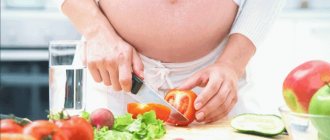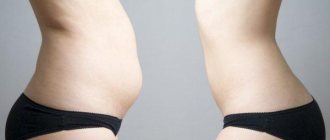A weight gain of 10–14 kg during pregnancy is completely normal. However, if a pregnant woman recovers too quickly, this can negatively affect the health of the expectant mother and child.
Pregnancy is a special time in the life of every woman. All thoughts are aimed at successful pregnancy, and actions are determined by the new state of the body. Often, even the most disciplined of us decide to give up on prohibitions and, so to speak, have a blast, justifying overeating and laziness with the needs of the little man growing in our bellies.
The payback for such frivolity comes quite quickly in the form of uncontrolled weight gain, shortness of breath, swelling and high blood pressure. To avoid these unpleasant consequences, you should not relax too much and lose vigilance. Your baby will benefit from proper nutrition and light physical activity, not just another cake on the couch in front of the TV.
Pros and cons
If a woman’s weight before conceiving a child was normal, then the natural rate of increase is up to 15 kilograms up to 9 months. In the case when the indicator is exceeded already in 4-5 months, you should think about losing weight. Extra pounds threaten to complicate childbirth. It is also necessary to adhere to a diet for those who were mildly obese before pregnancy. Arguments for dieting while pregnant:
- improving the chances of giving birth to a healthy child (if the fetus gains more than 4 kilograms due to the mother’s abundant nutrition, this leads to a weakening of contractions);
- reducing the risk of complications during childbirth;
- improved health (a balanced diet allows the body to supply proteins, fats, carbohydrates, as well as essential vitamins and microelements);
- easy weight loss after childbirth.
However, you shouldn’t get carried away with diets in their common understanding. Eating one type of product, so-called mono-diets, is strictly contraindicated. Also, pregnant women should not avoid meat and fish products, since the body of the mother and child receives protein from them.
SAMPLE MENU
Nutritionists have developed several types of dishes for pregnant women so as not to gain weight while in an interesting position. If you change their combinations, it is easy to create a varied menu for the week from healthy foods.
- For breakfast, porridge made from any cereal except semolina is suitable. Other acceptable food options are oat pancakes, low-fat cottage cheese with banana or other fruits. Drinks include green tea with Maria cookies or a toasted piece of bread with cheese.
- The second breakfast consists of fruits, a handful of nuts or natural sweets - marmalade, marshmallows.
- A full lunch includes a vegetable salad, a first course in meat, fish or vegetable broth. The second course is potatoes, porridge, pasta with meat or fish. Compote, fruit drink.
- An afternoon snack will restore strength and satisfy your hunger with seasonal fruits, an omelet with vegetables, cheesecakes or cottage cheese casserole, and a vegetable salad with olive oil. Drinks include water and diluted juice.
- During dinner, treat yourself to a rice dish with vegetables or fruits, lazy dumplings, baked or boiled fish with a vegetable side dish. Drink herbal tea.
- The second dinner is purely symbolic: 100–150 g of lactic acid drink or cottage cheese, 1–2 pieces of bread.
To enhance the taste of dishes, use fresh dill, parsley and others. Prepare dishes by steaming, boiling or baking. The pregnancy period is an incentive to purchase a steamer. After the baby is born, it will be indispensable in recreating tasty and healthy dishes from fruits, vegetables and other products.
To tame your appetite during pregnancy, always be prepared. A pregnant woman must have an apple, banana or any other fruit, bread, and a bottle of yogurt in her bag. This will help satisfy a sudden attack of hunger and avoid eating something harmful.
Proper nutrition for an expectant mother is not much different from the healthy diet of an ordinary woman. If you stick to it during pregnancy, then perhaps it will become a habit that a woman should maintain throughout her life.
When doctors recommend losing weight during pregnancy: medical indications
Experts have repeatedly stated that pregnancy and childbirth proceed better if a woman’s weight is normal. However, for some indications, it is recommended to lose weight while pregnant. The reasons are related to risks to the health of the fetus and mother. So, medical indications for losing weight are:
- improvement of the birth process;
- risk of hypertension and diabetes.
The incentive to lose weight is the health of the child. A mother who has begun to feed for two eats a lot of sweet, flour and fatty foods, while thinking that such nutrition is beneficial to the fetus, is mistaken. A healthy child can be born only if the diet is balanced and complete, it contains the optimal amount of protein, fats and carbohydrates. The diet during pregnancy is aimed primarily at ensuring that the expectant mother, and with her the child, receive the maximum of nutrients from food, and not empty calories.
When to lose weight during pregnancy
Losing weight for no apparent reason is not safe. Indications for losing weight are described above, but there are also contraindications under which you cannot lose weight:
- problems with the gastrointestinal tract;
- liver and kidney diseases;
- problems with the heart and blood vessels;
- when weight gain corresponds to anatomical indicators.
Strict diets are strictly prohibited, as they do not pose a risk to development. Even if a woman used mono-diets, vegetarian or raw food, the menu needs to be diversified. There is no point in abruptly including foods into your diet that were not previously on the menu. It is better to slowly introduce them into the diet, making their intake normal by the middle of the second trimester.
What are the dangers of uncontrolled weight loss during pregnancy for a child?
Losing weight when not enough nutrients enter the body is dangerous for the health of the fetus. Main risks:
- risk of miscarriage;
- development of diseases in the womb (including diseases of the gastrointestinal tract, kidneys, liver);
- insufficient nutrition of the brain, and, as a consequence, diseases associated with it.
Uncontrolled weight loss will in any case harm the child. During pregnancy, the mother’s body provides nutrition to the fetus, and if the fetus itself does not receive enough nutrients, then so does the child.
How weight loss can affect the placenta and blood supply
The placenta is an organ that forms in a woman during pregnancy. She is responsible for transferring nutrients to the baby. As a result of poor nutrition, placental insufficiency occurs, which is expressed in dysfunction of the organ. The placenta can no longer provide the fetus with the necessary substances, and this can even lead to death. Also, uncontrolled nutrition affects the fact that blood circulation is disrupted, and this causes the development of oxygen deficiency.
NORMAL INTESTINE OPERATION
Pregnant women should avoid constipation, as this can cause unwanted pressure on the uterus, especially later in pregnancy. To normalize the digestion process, it is useful to start the morning with a glass of water with dried fruits. For example: dried apricots or prunes. A pregnant woman's menu must include liquid dishes and a sufficient amount of vegetables and fruits.
It is important to maintain a drinking regime if there are no restrictions on fluid intake. Pure still water, juices from fresh vegetables and fruits, compotes, herbal or green tea. Some fruit drinks are contraindicated during pregnancy. For example: a drink made from viburnum causes uterine contractions, which creates a threat of miscarriage. If swelling is present, the volume of fluid is reduced to 1 liter per day.
When needed for medical reasons: a diet without harm to the child
A diet without harm to the child and mother includes vegetables, fruits, dairy products, and unrefined foods. Vegetable oils, meat and fish are also required. You should not completely exclude sausages, sausages, butter, white bread and other unhealthy foods from your diet, especially if you are used to seeing them on your table every day. But such things need to be included in a minimal amount, since in addition to calories they do not contain harmful, carcinogenic substances.
Essential vitamins for proper metabolism
Vitamins are best absorbed from food, not vitamin complexes. This is explained by the fact that tablets, even of excellent quality, affect the excretory system, forcing it to work at the limit of its capabilities. This will not be beneficial during pregnancy. For the development of the fetus and proper metabolism, vitamins of groups A, B, E, C, Omega-3 group, potassium and calcium are necessary. You can find them in:
- any varieties of sea and river fish;
- green, red, orange and yellow vegetables;
- all types of greens and salad;
- fermented milk products (but they should not be high in fat);
- cereals;
- dried fruits and nuts;
- fruits;
- lean chicken and turkey.
Vegetable oils that are rich in vitamin E will be useful. They help improve metabolism, better functioning of the placenta, and keep a woman’s skin, hair and nails in excellent condition. Vitamin E also helps improve the condition of the skin, after childbirth there will be fewer stretch marks, the skin will be smoother and more even. You can find it in fish oil, flaxseed oil, and nuts.
Amount of water and liquid
It is recommended to drink at least two liters of clean water per day.
But if there is swelling and body weight increases due to fluid retention, you can reduce it by half a liter. Liquid that is included in broths and soups - in unlimited volume. You should be careful with fruit drinks, milkshakes, and juices - in addition to healthy vitamins, they also contain a large amount of sugars, which is not good for the child’s health.
Number of servings per day
The amount of food consumed is purely individual. It cannot be said that a woman whose weight before birth was 45 kilograms and one whose weight reached 100 kg need to choose portions of the same size.
For a woman whose weight fluctuates between 60-70 kg during pregnancy, portions of 200-300 grams are optimal, with at least four meals. Optimal power supply:
- breakfast;
- lunch;
- dinner;
- snack;
- dinner.
The number of servings per day is from four to five. It is not recommended to reduce the frequency, as there is a risk that the child will not receive nutrients on time for his development.
MEAL MODE
A good way to get rid of possible hunger pangs during pregnancy is to eat small amounts frequently. The usual three meals a day is increased for pregnant women by 2 meals: second breakfast and afternoon snack. The break between meals is approximately 3 hours. If you need a late dinner, drink a glass of kefir. Follow the rule - no food 2 hours before bedtime.
A simple trick helps a lot: eating small plates throughout your pregnancy. To enjoy the taste of the dish, use not cutlery, but, for example, a dessert spoon and fork. Take your time while eating. If the usual portion of a dish does not satisfy your hunger, you should take a break for 20 minutes. This time is enough for the brain to receive a signal of saturation. It is important not to skip meals - this is harmful to the health of the woman and the unborn baby. Long breaks in nutrition will lead to an increase in portions of food, even if it is made from healthy foods, and this will immediately affect the figure of a pregnant woman.
How to lose weight in your legs while pregnant: exercises and strength training on muscle groups
The legs are subject to serious stress while carrying a child. They bear not only the weight of the developing child and the increased weight of the mother. Hormonal changes occur in the female body, which also affects the limbs. The basis for losing weight in your legs is proper nutrition. Exercises in the pool are perfect - they will tone up not only your legs, but also your back, hips, and chest. Useful exercises for legs and buttocks:
- bicycle (lying on your back, with your legs raised, make movements as if you were riding a bicycle);
- walking in place (feeling the muscles, just walk in place, raising your knees to 30-40 degrees);
- butterfly (spread legs are connected at the feet, then arms are spread to the sides).
Light exercise on a fitball will help (in addition to strengthening the legs, this helps reduce the risk of perineal rupture during childbirth), yoga (strengthens the pelvic ligaments, which increases the speed of childbirth).
During pregnancy, jumping rope, roller skating and skating, fast running, aerobics, and pulling up dumbbells are prohibited.
Is it possible to lose weight in the third trimester?
In the last trimester, weight gain occurs due to fetal growth.
Some women even lose weight during this period, as they gradually lose their own extra pounds. During this period, the emphasis is on salads, fruits, greens, light dairy products and whole grain dishes. Three weeks before the expected date of birth, it is advisable to include a minimum of calcium-rich foods, meat and fish. Some restriction of the diet does not threaten problems with the fetus, but it will allow the expectant mother to start losing pounds.
Doctor's recommendations
You should lose weight under the supervision of a doctor, and if there are medical indications for it. It is impossible to lose weight if a woman is not psychologically comfortable (feels fat). The doctor's recommendations are:
- Only a specialist can correctly create a diet;
- light workouts will help you cope with excess weight and improve your metabolism;
- You should not get carried away with mono-diets, vegetarianism and raw food diets (in rare cases, it is allowed as a fasting day).
Pregnancy is a complex physiological process. It is not possible to predict how weight loss will affect the child’s body in a particular case. Therefore, you should only engage in weight loss for medical reasons; at the slightest danger, consult a doctor.
FAST DAYS METHOD
Resorting to such actions during pregnancy is allowed only after the approval of a gynecologist. If excess weight is not associated with a disease, then the root of the problem lies in the use of prohibited products. It is worth once again carefully reviewing your diet and removing factors that contribute to gaining excess kilograms.
Fasting days can also improve a woman’s condition with edema and high blood pressure. This usually happens in late pregnancy, starting at 28 weeks. It is allowed to arrange it once a week. The daily intake of products is divided into 6 doses at intervals of 4 hours. Last dinner no later than 18:00. Typically, 2 types of fasting days are used.
- apple: stock up on 1.5 kg of fresh apples and divide them into 6 servings;
- dairy: in this case, the food consists of 0.5 kg of low-fat cottage cheese and 1 liter of kefir.











